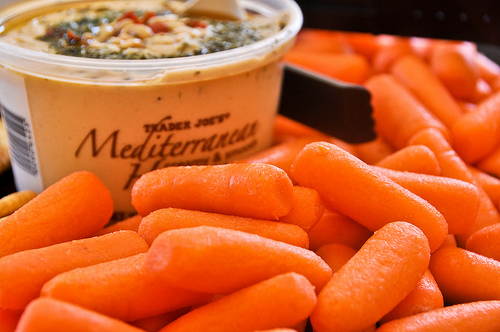
I'm not a big fan of vegetables as a rule. There, I said it. One of the few vegetables that I really truly like is baby carrots. I always buy a bag or two whenever I make a trip to the grocery store. I toss them onto salads, use them to scoop up hummus, and eat them with a little bit of ranch dressing dip. In a pinch, I will throw a handful into the slow cooker when I'm making a roast, but for the most part, I eat them raw.
I recently learned the difference between "baby carrots" and "baby cut carrots," and I have to admit, I was somewhat scandalized.
Baby carrots are, as the name implies, carrots which are babies. These small carrots are harvested when they are about an inch long. Baby carrots are tender and sweet, with none of the tough outer skin that you find on adult carrots. If you find actual baby carrots at the store, they can be quite expensive compared to baby cut carrots.
Baby cut carrots are regular carrots that have been whittled and sanded down to a baby shape. This has been a lucrative way for the carrot industry to use up second-grade carrots that otherwise could not have been sold as whole carrots. (You see them being called "deformed," but that's an unnecessarily pejorative term. Anyone who has ever gardened knows that carrots grow in all sorts of shapes, there's nothing wrong with it.)
Baby cut carrots, because they come from adult carrots, tend to be much denser and more woody than true baby carrots.
(Incidentally, rumors that baby cut carrots are soaked in chorine and pose a risk to your family are completely false.)
Even knowing this tragic truth about baby cut carrots, I'll still keep buying them. Sure I could peel and chop my own whole carrots for a fraction of the cost. But let's be honest, ain't nobody got time for that.
Image courtesy Flickr/orionlee

1 comments